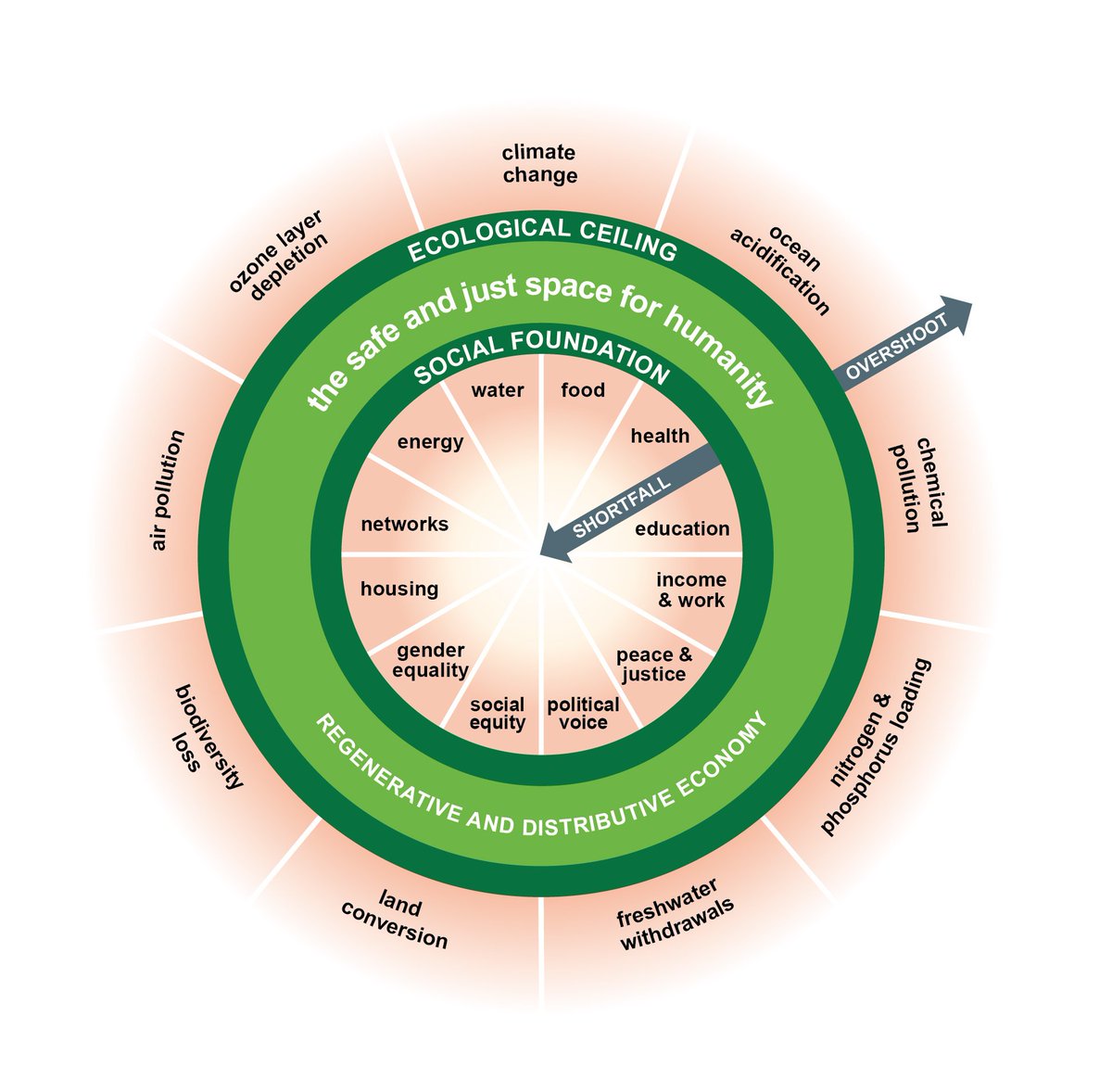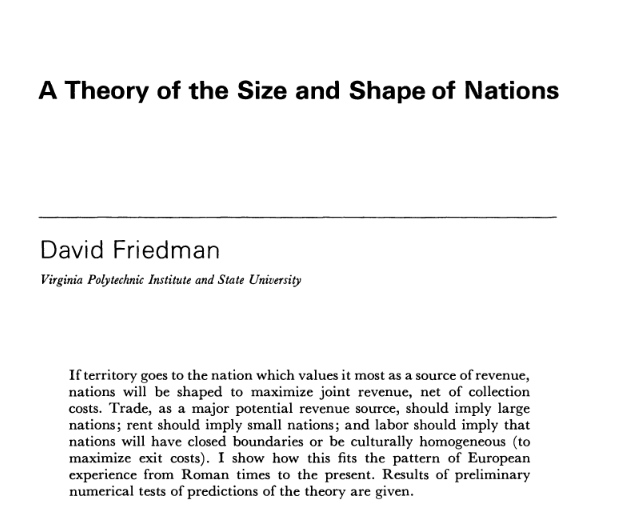
Québécois Econ prof @MasonEconomics. LSE-trained TTU-proud, GMU-blood. I do econ hist, pol econ & the measurement of living standards. Book harvester & French
How to get URL link on X (Twitter) App


 The doughnut model makes a strong claim: capitalism and growth inherently push societies out of that space and the result is imbalance, injustice, and ecological overshoot. In other words, we leave the doughy part of the doughnut.
The doughnut model makes a strong claim: capitalism and growth inherently push societies out of that space and the result is imbalance, injustice, and ecological overshoot. In other words, we leave the doughy part of the doughnut. 
https://twitter.com/IvanWerning/status/2010397847909478669
 Friedman’s core insight is that states expand and reshape themselves to maximize net extractable revenue, not to maximize welfare. Territory (and institutions) go to whoever values them most as tax bases, net of collection costs (and one could argue this could be extended to transaction costs)
Friedman’s core insight is that states expand and reshape themselves to maximize net extractable revenue, not to maximize welfare. Territory (and institutions) go to whoever values them most as tax bases, net of collection costs (and one could argue this could be extended to transaction costs)
https://twitter.com/gerardomunck/status/1996596228285767740Article 1: Geloso, V. J., & Salter, A. W. (2020). State capacity and economic development: Causal mechanism or correlative filter?. Journal of Economic Behavior & Organization, 170, 372-385.

 The "Doughnut Model" by Kate Raworth is the most influential framework in degrowth thinking. It claims sustainable development exists only between a "social foundation" and an "ecological ceiling." Outside that? Injustice or unsustainability. But does it hold up empirically?
The "Doughnut Model" by Kate Raworth is the most influential framework in degrowth thinking. It claims sustainable development exists only between a "social foundation" and an "ecological ceiling." Outside that? Injustice or unsustainability. But does it hold up empirically? 

 Here is the origin of the problem. When you do not have micro-data and only tables of income where there are intervals (0$ to 1000$ etc. -- see image), you need some way of assuming distributing within intervals and across them. The usual method is Pareto interpolation.
Here is the origin of the problem. When you do not have micro-data and only tables of income where there are intervals (0$ to 1000$ etc. -- see image), you need some way of assuming distributing within intervals and across them. The usual method is Pareto interpolation. 

 On the graph here, we used the Maddison Project Database and synthetic control to construct Cuba without the revolution, embargo, and Soviet Aid. The red line is the synthetic (counterfactual), orange is actual Cuba but with the "flawed" GDP numbers (flawed because they are largely assumed). The green uses John Devereux's recent reconstruction of Cuba's national account. The blue subtracts Soviet Aid.
On the graph here, we used the Maddison Project Database and synthetic control to construct Cuba without the revolution, embargo, and Soviet Aid. The red line is the synthetic (counterfactual), orange is actual Cuba but with the "flawed" GDP numbers (flawed because they are largely assumed). The green uses John Devereux's recent reconstruction of Cuba's national account. The blue subtracts Soviet Aid.

 1/ Derrière des slogans comme « champions nationaux » ou « industries stratégiques », le protectionnisme se cache sous un vernis technique. Ca donne des platitudes comme « promouvoir des champions nationaux », « protéger nos industries stratégiques », « rapatrier les chaînes d’approvisionnement » ou encore « se protéger contre les abus des étrangers ».
1/ Derrière des slogans comme « champions nationaux » ou « industries stratégiques », le protectionnisme se cache sous un vernis technique. Ca donne des platitudes comme « promouvoir des champions nationaux », « protéger nos industries stratégiques », « rapatrier les chaînes d’approvisionnement » ou encore « se protéger contre les abus des étrangers ».

https://twitter.com/HoCStaffer/status/1914408560320242167First, it's important to distinguish between two types of social mobility: absolute and relative. Absolute mobility refers to the ability to earn more than one's parents, while relative mobility concerns the extent to which a person's income rank is independent of their parents' rank.



 The Great Leveling, a sharp decline in U.S. income inequality, is often dated to the 1940s. But did it start earlier? We argue that correcting for regional price differences suggests a more gradual decline beginning in the 1920s. 2/n
The Great Leveling, a sharp decline in U.S. income inequality, is often dated to the 1940s. But did it start earlier? We argue that correcting for regional price differences suggests a more gradual decline beginning in the 1920s. 2/n

 The story usually told is that inequality was rising. I dispute that in full. For reasons that historians know and agree but never aggregated as corrections to measurement. There are five big corrections.
The story usually told is that inequality was rising. I dispute that in full. For reasons that historians know and agree but never aggregated as corrections to measurement. There are five big corrections.

https://twitter.com/cremieuxrecueil/status/18667523669865309851 (continued): If you shift to life expectancy at 65, which is bound to be less affected by this, the US is not as much of an outlier (see big black dot).


https://twitter.com/gabriel_zucman/status/1669349694739476481First, you have to understand the following thing: the work of Zucman with Piketty and Saez (henceforth PSZ) builds heavily on a 2003 paper in QJE. I revisited the data, assumptions and methods of that paper in two published papers -- one at Economic Inquiry and the other at EJ
https://twitter.com/BrianCAlbrecht/status/1668986738126073856Why? I used to be interested in illegal work, sidelines, underground economy etc. I can tell you that cheating at the low-end of the ladder is easier because the sums are smaller and easier to hide.
https://twitter.com/DAcemogluMIT/status/1660269222621069315The problem starts with fact that there is a great deal of knowledge that is simply tacit and impossible to code. Moreover, the *value* of that tacit knowledge is impossible to code as well. For example, riding a bike is hard to express into a book/code. So is coding its worth

https://twitter.com/JasonSCampbell/status/16418893368734310402. No, Africa would be better off. We know that more rugged areas in Africa (ruggedness made the slave trade harder) are richer than less rugged areas. This is strong supportive evidence that where the slave trade could flourish, the worst off people were.

https://twitter.com/jrgptrs/status/1632019678661955586This was ultimately published in the Economic Journal -- doi.org/10.1093/ej/uea…. It showed that this was an immensely flawed paper.

 We take inspiration from Robert Higgs' 1992 "Myth of Wartime Prosperity" in the Journal of Economic History but shift from the USA to Canada.
We take inspiration from Robert Higgs' 1992 "Myth of Wartime Prosperity" in the Journal of Economic History but shift from the USA to Canada. 

 We argue that @MilesCorak and others were right to point out that income inequality reduces the chances at upward *relative* intergenerational income mobility. However, we also argue that this effect is mitigated by the role of institutions.
We argue that @MilesCorak and others were right to point out that income inequality reduces the chances at upward *relative* intergenerational income mobility. However, we also argue that this effect is mitigated by the role of institutions.

https://twitter.com/fiona_mugure/status/1546429841876127752My friend and colleague Pierre Desrochers (we co-authored four articles together on markets and the environment) for example showed how many byproducts from waste were developed in Britain during the industrial revolution cambridge.org/core/journals/…